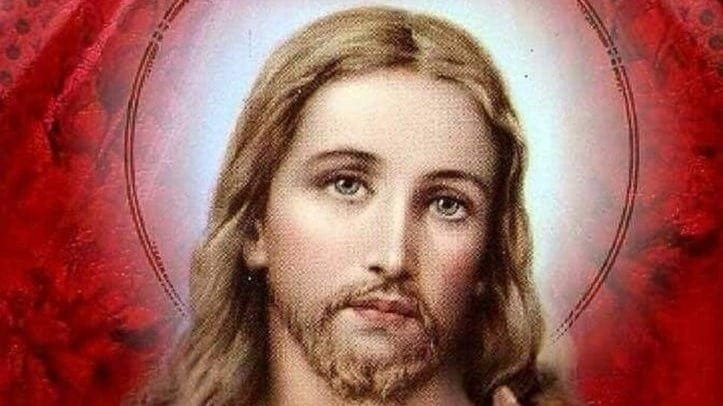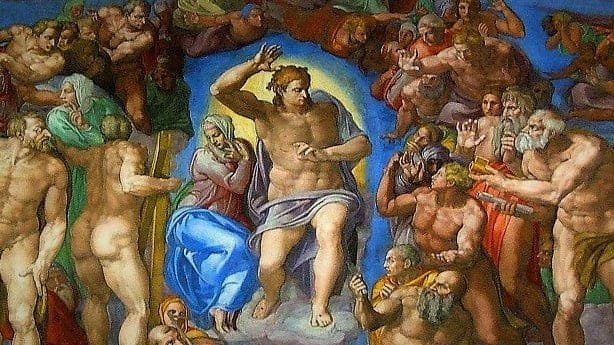July 3: SAINT THOMAS THE APOSTLE.
Mass prayers ,proper readings, Gospel commentary and video reflection.
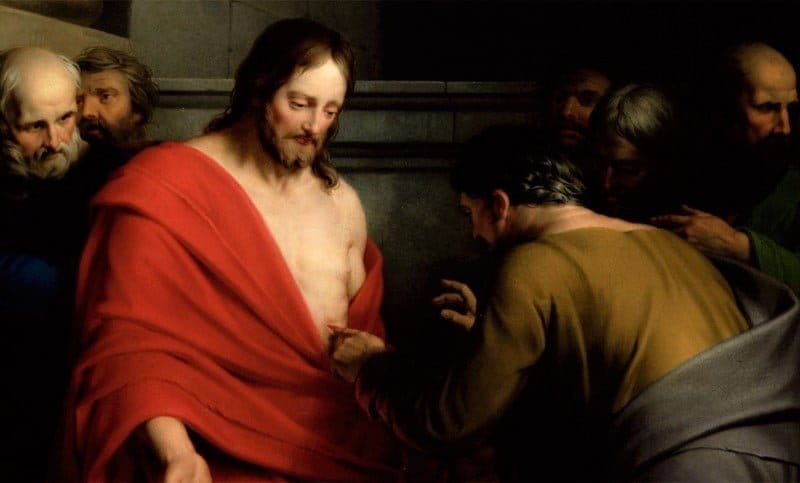
ENTRANCE ANTIPHON
Deus meus es tu, et confitébor tibi: Deus meus es tu, et exaltábo te, confitébor tibi, quóniam factus es mihi in salútem.
You are my God, and I confess you: you are my God, and I exalt you; I will thank you, for you became my savior.
[–» Greeting]
The Glória in excélsis (Glory to God in the highest) is said.
COLLECT
Grant, almighty God, that we may glory in the feast of the blessed Apostle Thomas, so that we may always be sustained by his intercession and, believing, may have life in the Name of Jesus Christ your Son, whom Thomas acknowledged as the Lord. Who lives and reigns with you.
Proper Readings
READING I
Eph 2:19–22
Brothers and sisters: You are no longer strangers and sojourners, but you are fellow citizens with the holy ones and members of the household of God, built upon the foundation of the Apostles and prophets, with Christ Jesus himself as the capstone. Through him the whole structure is held together and grows into a temple sacred in the Lord; in him you also are being built together into a dwelling place of God in the Spirit.
The Word of the Lord.
hanks be to God,
RESPONSORIAL PSALM
R. Go out to all the world and tell the Good News.
Eúntes in mundum univérsum, prædicáte Evangélium.
Praise the Lord, all you nations;
glorify him, all you peoples!
R.
For steadfast is his kindness for us,
and the fidelity of the Lord endures forever.
R.
ALLELUIA
Quia vidísti me, Thoma, credidísti, dicit Dóminus; beáti qui non vidérunt et credidérunt.
You believe in me, Thomas, because you have seen me; blessed are those who have not seen, but still believe!
R. Alleluia.
GOSPEL
Jn 20:24–29
Thomas, called Didymus, one of the Twelve, was not with them when Jesus came. So the other disciples said to him, “We have seen the Lord.” But Thomas said to them, “Unless I see the mark of the nails in his hands and put my finger into the nailmarks and put my hand into his side, I will not believe.” Now a week later his disciples were again inside and Thomas was with them. Jesus came, although the doors were locked, and stood in their midst and said, “Peace be with you.” Then he said to Thomas, “Put your finger here and see my hands, and bring your hand and put it into my side, and do not be unbelieving, but believe.” Thomas answered and said to him, “My Lord and my God!” Jesus said to him, “Have you come to believe because you have seen me? Blessed are those who have not seen and have believed.”
The Gospel of the Lord.
Praise to you, Lord Jesus Christ.
FOR TODAY’S REFLECTION,
CLICK HERE, HERE AND HERE.
PRAYER OVER THE OFFERINGS
We render you, O Lord, the service that is your due, humbly imploring you to keep safe your gifts in us, as we honor the confession of the Apostle Saint Thomas and offer you a sacrifice of praise. Through Christ our Lord.
[–» Eucharistic Prayer]
[–» Preface of Apostles]
COMMUNION ANTIPHON
Mitte manum tuam, et cognósce loca clavórum: et noli esse incrédulus, sed fidélis.
Take your hand and feel the place of the nails, and be no longer unbelieving but believe.
[–» Communion]
PRAYER AFTER COMMUNION
O God, as we truly receive in this Sacrament the Body of your Only Begotten Son, grant that, recognizing him with the Apostle Thomas by faith as our Lord and our God, we may proclaim him by our deeds and by our life. Who lives and reigns for ever and ever.
[–» Concluding Rite
GOSPEL COMMENTARY
JULY 3: SAINT THOMAS THE APOSTLE
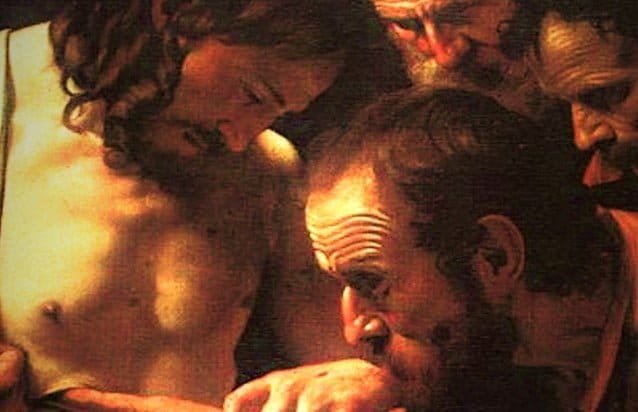
Today’s Gospel recounts how saint Thomas the Apostle responded with doubt, with incredulity when the other Apostles told him that they have just seen the Risen Lord: “Unless I see in his hands the print of the nails, and place my finger in the mark of the nails, and place my hand in his side, I will not believe (Jn 20:25).”
So eight days later, when all the apostles were gathered together with the doors shut, Our Lord appeared again and told Thomas: “ ‘Put your finger here, and see my hands; and put out your hand, and place in it in my side; do not be faithless, but believing.’ Thomas answered him, ‘My Lord and my God!’ Jesus said to him, ‘HAVE YOU BELIEVED BECAUSE YOU HAVE SEEN ME? BLESSED ARE THOSE WHO HAVE NOT SEEN AND YET BELIEVE (Jn 20: 27-29).’”
- Thomas’ absence during Our Lord’s 1st appearance was not a pure accident but rather falls within Divine Providence. His doubt was an additional opportunity to demonstrate that Jesus’ Risen Body is for real. As St. Gregory the Great said: “It was not an accident; God arranged that it should happen. His clemency acted in this wonderful way so that through the doubting disciple touching the wounds in his Master’s body, our own wounds of incredulity might be healed… And so the disciple, doubting and touching, was changed into a witness of the truth of the Resurrection” (In Evangelia homiliae, 26, 7).
- “My Lord and my God!” It is not a mere exclamation of surprise but rather a wonderful declaration, a marvelous act of faith of Thomas in the divinity of Jesus Christ, which for us can be an act of faith as well especially before the real presence of Our Lord in the Holy Eucharist.
- Faith involves the “conviction of things which are unseen (Heb 11:1)”. Our Lord told Thomas as well: “Have you believed because you have seen me? Blessed are those who have not seen and yet believe (Jn 20:29).” Our Lord asks from us this firmness in faith, not founded on senses nor on mere sentimentality, but on the humility of the mind and heart to accept what He had revealed and transmitted to us, knowing that as God, He can neither deceive nor be deceived.
Dear friends, in this world influenced by positivism and empiricism both of which espouse seeing as a prerequisite of believing, let us ask our Lord to give a boost of “living” faith which sustains our hope and is united and manifested in charity, not only for us but for others as well: a faith which is based on the credibility of He who revealed, God, through His Apostles and the Church He founded on Peter. But for this, the importance of humility for “Faith is the humility of the mind which renounces its own judgement and surrenders to the verdict and authority of the Church (St. Josemaria, Furrow, n. 259).”
As witnesses of Christ’s Resurrection, the Apostles enkindled the world with the preaching of the Good News and changed the course of humanity. “God is the same as always. It is men of faith that are needed: and then, there will be a renewal of the wonders we read of in the Gospel. Ecce non est abbreviata manus Domini, God’s arm, his power, has not grown weaker (St. Josemaria, ‘The Way,’ n. 586).”
VIDEO COMMENTARY ON TODAY’S GOSPEL
TOPIC 1: IS THERE A BIT OF A DOUBTING THOMAS IN YOU?
Today is the feast day of Saint Thomas the Apostle more commonly known as the Doubting Thomas. Jesus had to show Himself twice to His apostles, particularly to Thomas, to prove that His resurrection was no hoax.
The profession of our faith is hinged on the words of Jesus to him: “Have you come to believe because you have seen me? Blessed are those who have not seen and have believed” (John 20:29).
We all have a little bit of Thomas in each one of us.
TOPIC 2: How do you respond to people who
doubt you and accuse you of being untruthful?
The most Rev. Robert Runcie, retired Archbishop of Canterbury, wrote in his book, Seasons of the Spirit, that he once got on a train in England and discovered that all of the other passengers in the car were patients at a mental institution being taken on an excursion.
A mental hospital attendant was counting patients to be sure that they were all there: “One, two, three, four, five…”. When he came to Archbishop Runcie, he said, “Who are you?” “I am the Archbishop of Canterbury,” Rev. Runcie replied. The attendant smiled and, pointing to him, continued counting, “…six, seven, eight…”
Imagine yourself in front of Jesus on that day when He shows up, with you still in a state of doubt that He has actually risen. Instead of getting angry at you, Jesus gently invites you to touch His wounds.

Jesus showed compassion even if Thomas doubted Him. His compassion is borne out expressing to us that to doubt is alright. It does not mean we have no faith. Doubt must be like the rays of the sun that lead to the source. God wants us to come to Him so that He may touch our wounds and heal them. When we seek Him, He appears and satisfies our hungering faith.
It is alright then to doubt for as long as we use that emotion to fuel our desire to know more about our faith. Someone once said, “It’s not as a child that I believe and confess Jesus Christ. My hosanna is born of a furnace of doubt.”
It would be unfair to give Thomas though the nickname “Doubting Thomas.” It was not just him who showed doubt of Christ’s resurrection. All the apostles did. When Mary Magdalene came to tell them what happened on her visit to the tomb, they would not believe it (Mark 16:11). Perhaps, it was only Thomas that reacted excessively. His outburst was what was recorded by John in his writings.
We often react in ways not similar to Jesus when people doubt us. We become angry, forget proper decorum and be rude or abrasive. This can create tension when people doubt our stories and statements. We feel untrusted, branded as a liar and accused of peddling untruths.
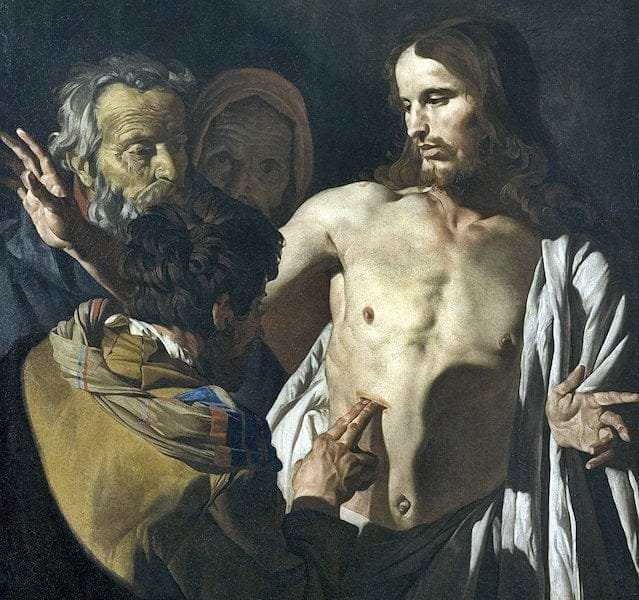
Anger becomes the fuel for bitterness and resentment, broken relationships and disunity. We can turn to the example of Jesus in showing us what holiness truly means. Instead of berating Thomas for his unbelief, Jesus guides Thomas’ hands to His wounds.
Jesus shows us how we can better understand one another by reaching out with compassion and calm. In the heat of the moment, we may not be able to muster the will and the strength to be level-headed, patient and loving when we are doubted. It may need Jesus to be involved. And that’s why we must never forget to be prayerful, asking for the graces we need to be holy.
The same applies to the doubter who may have pre-judged and condemned the other person. When we are overcome with doubt on people around us, we must collect ourselves and endeavor to reach out to understand and to clear the air.
When we also start to doubt our God in our pain and suffering, let us repeat the beautiful words of Thomas, one of the best expressions of faith ever recorded – “My Lord and my God.” The beauty of our doubt is when it is channeled to finding what we have lost. When discovering it, we come to believe. We believe not because we see. We believe because we have seen with our hearts.
Stay updated: subscribe by email for free TO OUR NEW WEBSITE www.catholicsstrivingforholiness.org (PUT YOUR EMAIL IN THE SUBSCRIBE WIDGET).
We are also in www.fb.com/Catholicsstrivingforholiness. Kindly help more people in their Christian life by liking our page and inviting your family, friends and relatives to do so as well. Thanks in advance and God bless you and your loved ones! Fr. Rolly Arjonillo
